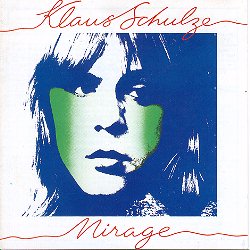| Discography |
 |
Reviews |
| »Congratulations must go to Klaus, not only for the bold beauty of his music but the honesty of
his words, exhibited on the sleeve of this fascinating and rewarded album. For the German boy-genius of the synthesizer display a rare honesty as he explains: "Music, to me, is the backgroun background
to a mental picture, but the exact interpretation must be made by the listener, hence the music
is only half-composed and the listener himself should attack the composition to gain a mental
repercussion. The listener has to add the meaning. This is why, perhaps, people love or hate my
music! ..." ... In those brief, apparently halting statements in English, Klaus is at once open, frank
and eminently sensible. For listener participation is a vital ingredient of all good music. ... Normally, I dislike electronic music... With a musician like Klaus at the controls, the unfolding layers of sound, their tones, textures and colours are uplifting, inspiring and joyous. The effect is like a mystical choir readying themselves for some great and sacred act to be performed. ... « (C.W., "Melody Maker", England, 7 May 1977) |
|||
| »Klaus Mirage & Docteur Schulze. Mirage ou comment Monsieur Schulze repart vers l'inédit et offre au futur un nouveau chef-d'-oeuvre. ...[many,many words] ... Schulze est plus proche de votre coeur. Belle leçon. Ceci dit, et Mirage en est la preuve terrassante, il es l'un des plus grands créateurs de la musique actuelle, toutes étiquettes défuntes. Voilà la musique vivante, la vraie.« (Hervé Picart, "Best", France, May 1977) |
|||
| »La musique de Mirage, du moins en sa première face, est un évident retour en arrivière. Klaus
Schulze est tombé dans le piège de vouloir faire un nouveau Timewind; on ne ferait pas
impunément un chef-d'oeuvre, et Timewind, en était un grand, le plus grand de toute cette
musique, ... Le principal attrait de l'album est à trouver au niveau du son. La fascination de Klaus
Schulze pour la voix humaine y est de plus en plus sensible. A tout instant, on croit entendre des
choeurs, des cris, des chuchotements, voire des mots: que disent les synthé?« (Jean-Marc Bailleux, "Rock & Folk", France, May 1977) |
|||
| »Quando si son spesi quattro anni a parlare di un artista coma Klaus Schulze per vederlo
conosciuto se non dalle masse, almeno da un numero notevole di ascoltatori, mi sembra giusto
accoglierne il successo con gioia. ... Il nuovo album di Schulze, Mirage giunge sul mercato inatteso: I precedenti Moondawn e "Timewind" avevano confermato il progressivo scivolamento tematico delle composizioni elettroniche di Schulze sui versante del ritmo e della pulsazione ariosa, frutto della continua tensione del linguaggio elettroacustico in seno al rock, cioè come elemento tecnico che fa parte di un fenomeno amplissimo. Ma Mirage viene a discutere, più che seguire, il tratto dei disegni di uno o due anni fa; certo l'immediato, lo spontaneo che sono in Schulze ora contattano l'esigenza di gestire anche attraverso "le forme" estetiche e tecniche il suono di questo straordinario musicista. ... = * * * * « (Maurizio Baiata, "Stereoplay", Italy, June 1977) |
|||
| »If you have always thought electronic music to be cold and mechanical, without depth and
feeling, then give this record a listen. You will be surprised.« (Peter Moser, "Eurock", USA, 1977?) |
|||
| »Das US-Fachblatt "Record World" verzeichnet in der Liste der erfolgreichsten Import-Platten
landesweit Klaus Schulzes LP Body Love. Mal sehen, wann Schulzes neue LP Mirage dort
auftauchen wird, schreibt doch "Record World": "Mirage wird ihn als einen der überragendsten
Komponisten elektronischer Musik etablieren." Und der "Melody Maker" gratulierte zu diesem
"fantastischen Album".« ("Fachblatt", Germany, July 1977) |
|||
| »Mirage is a strange pastoral landscape with vast shifts in color and texture, rather than the
layered melodic and harmonic structures of his previous albums.« (Allen Gunnison, "Trouser Press", USA, November 1977) |
|||
| »... It is extremely difficult to describe Schulze's music. Because it is highly individual, obviously
the best way to understand his style is to listen and judge for oneself. A good reference point
would be Mirage, his latest album, and an excellent example of the growing maturity...« (Steve Roach, "Synapse", January 1978) |